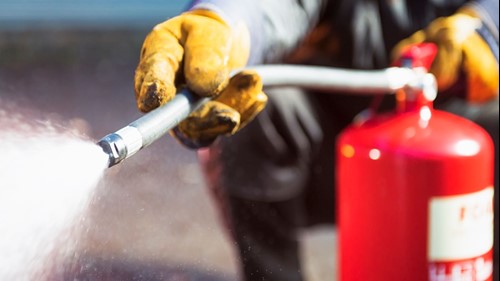In response to the Grenfell Tower fire of 2017, the Fire Safety Act 2021 was passed by UK Parliament, amending the Regulatory Reform Order (Fire Safety Order) 2005 to improve fire safety in English and Welsh residential buildings.
Features
UK fire and building safety laws and standards: more action needed
The Fire Safety Order has been criticised as being reactive rather than proactive, with changes in fire safety law inevitably following each tragedy. However, there are a number of positive changes in the Act, such as fire risk assessments for buildings with two or more sets of domestic premises now required to cover the entire building, including the exterior. Grenfell is a clear reminder of what can happen if a risk assessment doesn’t take a holistic view of the entire building.
However, a notable exclusion from the act is the lack of consideration for third-party accreditation of fire risk assessments. There is a perceived hesitancy to legislate for competency at this level, as under current rules, anyone can begin work as a fire risk assessor.
 Jonathan O'Neill: "The Fire Safety Order has been criticised as being reactive rather than proactive."
Jonathan O'Neill: "The Fire Safety Order has been criticised as being reactive rather than proactive."
The Fire Protection Association (FPA) has long advocated accreditation for fire risk assessors and has gone so far as to lobby government to include third-party assessments as a statutory defence in law. This would ensure the protection of all involved parties in the event of an incident, and lead to assessors being expected to be up-to-date on all developments in legislation and best practice. For comparison, the Gas Safe scheme, which is itself third-party accredited, mandates that gas work undertaken in a commercial or residential premises must be done by an individual accredited by the scheme.
Review of UK building regulations is essential
In line with this, the FPA is also calling for a full and thorough review of UK building regulations. It has currently been over a decade since the last review, and we are faced with a rapidly changing landscape, including more combustible building materials. In itself, this change of material is not necessarily a cause for concern, as it has been implemented in various countries already, and serves the drive to a model of construction with greater sustainability. But as this becomes more common, the already outdated regulations could slip ever further behind.
The iterative approach to legislation, plus involvement from fire and rescue service and sector bodies, has reduced the average number of fire-related fatalities in the UK per year by around 75 per cent in the past 30 years. Part of this progress was due to the involvement of the Inspectorate of Fire, who would investigate fires of note, and make recommendations to amend the building regulations as a result. Sadly the new Inspectorate does not have that remit or expertise.
 The Inspectorate of Fire used to investigate fires of note, and make recommendations to amend the building regulations as a result.
The Inspectorate of Fire used to investigate fires of note, and make recommendations to amend the building regulations as a result.
Their involvement in the past should not be underestimated. There are still ongoing problems to be addressed, often with devastating consequences. The Grenfell disaster itself highlighted several flaws in building regulations and a lack of competent fire assessments. While legislation operates in a reactive mode, it can never be assumed that fire is no longer a problem.
Following Grenfell, we saw the introduction of the Building Safety Act, which aims to reform the safety system for residential properties by appointing a Building Safety Regulator, giving a greater voice to residents, driving industry change, and creating a national framework for increased oversight.
While its focus on high-rise buildings inherently limits its scope, it has widely been seen as a step in the right direction by much of the industry. And while that step change may have been the right course in the wake of Grenfell five years ago, construction has ceaselessly continued to modernise since then, and there is a need for a different set of regulations to match this pace, with regular review and oversight.
These developments have run in parallel to the UK’s recent building safety scandal, which has in recent months seen Secretary of State for Levelling Up, Michael Gove, announce a fund of £5 billion to address the swathe of outstanding fire remediation works, much of which has seen leaseholders charged with eye-watering bills and left them unable to sell their affected properties.
Over 35 of the UK’s biggest construction companies have so far pledged to fix all buildings taller than 11 metres that they were involved in the construction of over the last 30 years. This agreement is set to become legally enforceable in the near future.
This has widely been seen as a great victory for the affected leaseholders, following months of grassroots campaigning, calling for the construction companies themselves to be held accountable instead of passing the bill on, which has seen some leaseholders served higher service charges than the value of their properties.
It is now for the government to ensure that this money is promptly paid, and that the levy to raise these funds from the industry is enforced, yet many have little faith that this will happen. Perhaps a more effective step would be for the government to fund and undertake these necessary remediations immediately, and then to recoup the money from the responsible parties, something the FPA has been calling for in the past three years.
The evidence provided to date during the Grenfell Tower Inquiry shows that leaseholders have purchased what were unsafe properties that did not comply with regulations. And because building regulations are the responsibility of the government, the public view is quite correctly, largely one that sees them as needing to step up to the task of fixing this on behalf of the affected leaseholders.
Unified building codes required across the UK
The FPA has also long been in favour of a set of unified building codes, to ensure the same standards and protections across the home nations and their devolved governments. There can sometimes be great disparities between them – one notable example being that when the Scottish government mandated a requirement for sprinkler systems to be installed in single-storey retail premises, England took almost three years to follow suit.
While it is often the case that the devolved governments can lead the way in fire safety regulation, more needs to be done to enable the industry in Britain to continue to innovate and deliver fire safety solutions suitable for the entire UK, and this will need government support, and regulatory backing.
However, the outlook for the future is increasingly positive, as there is expected to be a higher level of scrutiny for fire safety once all aspects of the Fire Safety Act come into full effect, with a much welcome greater emphasis on compartmentation.
That said, the recent removal of the Building Safety Manager role from the Building Safety Act raised eyebrows in the sector. The role and its function remains vital to building safety. Ultimately, someone still must fulfil the criteria of this role, and landlords and responsible persons will be unable to not have someone covering the functions of the building safety manager.
The concern remains however on what the legislative framework is going to look like, and to assuage leaseholders’ further fears of the uncertain future they’ve experienced thus far in the developing building safety crisis.
See the FPA website for more on fire safety:
Jonathan O’Neill MBE is managing director of the Fire Protection Association (FPA)
FEATURES

Underpinning safety training with neuroscience for long lasting impact
By SSE Active Training Team (ATT) on 30 November 2025
A behavioural safety training programme developed by Active Training Team for energy provider SSE has been carefully designed with neuroscientific principles in mind – resulting in a prestigious industry award for Best Training Initiative in 2024.

Why a painted line will never be enough
By UK Material Handling Association (UKMHA) on 20 November 2025
Businesses that operate material handling equipment like forklifts are being urged to submit accident and near miss details to a new confidential reporting portal so the industry can identify what needs to be done to improve safety standards.

Why workplace transport training is changing in 2026 and what it means for employers
By AITT on 26 November 2025
New workplace transport training categories due in January mean it is essential to ensure operators of material handling equipment have the necessary training for the exact type of machine they use, and accredited training providers are an ideal source of advice and conversion training.



